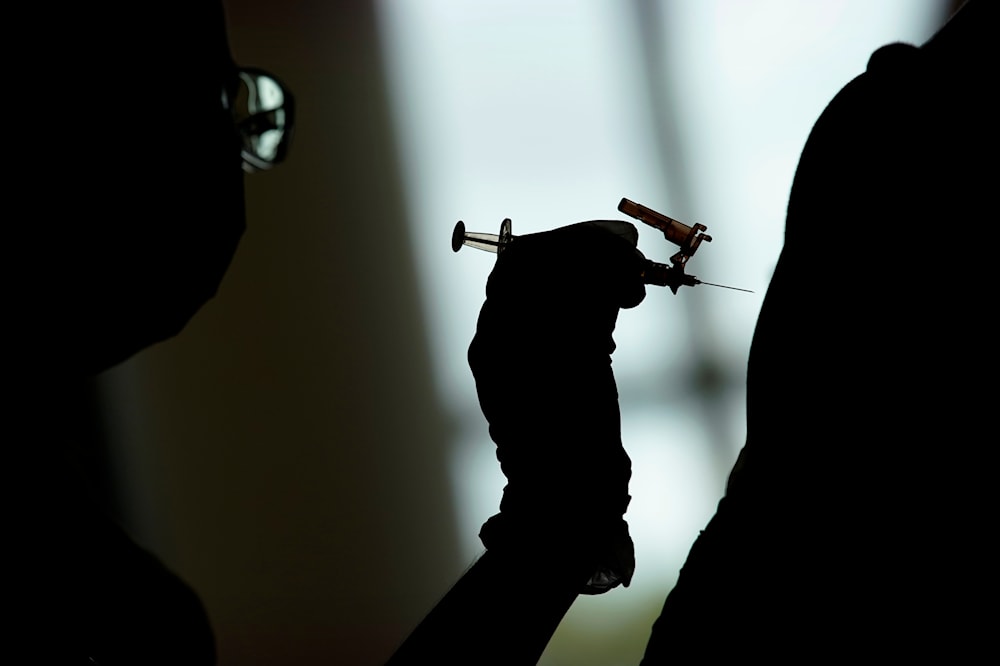Reuters: US CDC to study vaccine-autism link
The CDC's decision follows one of the largest measles outbreaks in the US in the past decade, with over 200 cases and two deaths reported in Texas and New Mexico.
-

In this April 26, 2021, file photo, a nursing student administers the Moderna COVID-19 vaccine at a vaccination center at UNLV, in Las Vegas. (AP)
The US Centers for Disease Control and Prevention (CDC) is preparing a large-scale study to explore potential links between vaccines and autism, Reuters reported, citing two sources familiar with the matter.
The move comes despite extensive scientific research that has already disproven or failed to find any evidence of such a connection.
The CDC's decision follows one of the largest measles outbreaks in the US in the past decade, with over 200 cases and two deaths reported in Texas and New Mexico. The outbreak has been attributed to declining vaccination rates in areas where parents have been misled into believing vaccines do more harm than good.
US Health Secretary Robert F. Kennedy Jr., who oversees the CDC, has long expressed skepticism about the safety of the measles, mumps, and rubella (MMR) vaccine. Last week, during a cabinet meeting, Kennedy downplayed news of a school-aged child dying from measles in Texas, calling such outbreaks routine and omitting any mention of vaccination's role in preventing the disease.
Kennedy later published an opinion piece on Fox News, where he supported vaccination but emphasized that it should remain a personal decision, advising parents to consult with their doctors.
In a joint statement released on Friday, the CDC and the US Department of Health and Human Services (HHS) cited rising autism rates as the reason behind the study, with the CDC vowing to "leave no stone unturned" in its research.
"The American people expect high-quality research and transparency, and that is what CDC is delivering," the statement said.
Dr. Dave Weldon, President Trump's nominee for CDC director, is set for a Senate committee hearing next week.
Dr. Wilbur Chen, a professor at the University of Maryland School of Medicine, raised concerns about the impact of such a study on public perception. "It sends the signal that there is something there that is worth investigating," potentially reinforcing the belief that vaccines are linked to autism, he explained.
Debunking the vaccine-autism link: Scientific consensus and political debate
While autism diagnoses have surged in the US since 2000, many researchers attribute this to increased screening and a broader understanding of the condition. However, some public figures have popularized the idea that vaccines are responsible, stemming from a discredited study by British researcher Andrew Wakefield in the late 1990s that falsely connected the MMR vaccine to autism.
To date, no rigorous studies have established a link between vaccines, medications, or their components—such as thimerosal or formaldehyde—and autism. Scientists largely believe that the neurological traits of autism develop in utero, with some studies linking it to maternal factors during pregnancy or complications at birth.
In a recent speech to Congress, Trump referred to the rising rates of autism among children. "So, we're going to find out what it is," he said, praising Robert F. Kennedy Jr. and others working on the issue.
The White House has not commented on the CDC's planned study. Kennedy's stance on vaccines has drawn criticism from some Republicans, including Senator Bill Cassidy of Louisiana, who during Kennedy's confirmation hearing suggested that Kennedy should reject any claims of a link between vaccines and autism. Kennedy denied being anti-vaccine but did not acknowledge the debunked link.
This week, Cassidy also questioned Dr. Jay Bhattacharya, Trump's nominee to lead the National Institutes of Health, about investigating the potential connection between autism and childhood vaccines. "I don't generally believe there is a link, based on my reading of the literature," Bhattacharya said, adding that while the cause of the rise in autism rates remains unknown, he would support a broad scientific agenda to find an answer.

 4 Min Read
4 Min Read








